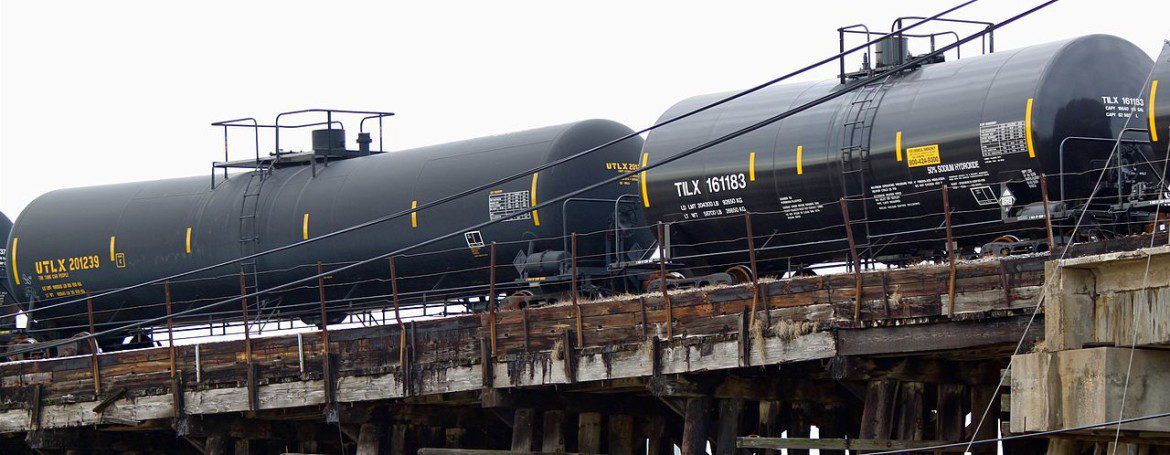AUGUSTA — After nearly five months of silence on the subject, state environmental officials will resume releasing information about the passage of oil trains through Maine.
The change in policy follows consultations with the Attorney General’s office on a controversial law, enacted in October, which prevents state and local officials from divulging any information about rail shipments of hazardous materials through Maine.
Before the law took effect, the Department of Environmental Protection had provided summary data on crude oil shipments to the public. Environmental, health and safety advocates supported government transparency, claiming that public awareness of the shipments would enable communities to prepare for or respond to catastrophic events such as the runaway train explosion at Lac-Mégantic, Quebec that killed 47 people in 2013.But the railway industry had argued in Maine and nationally that information about oil and other hazardous materials they carried should be confidential, citing concerns that it could be used to undercut their business or to carry out acts of terrorism.
In February, the Maine Center for Public Interest Reporting filed a request under Maine’s open records act to examine the oil data. In response, DEP spokesman David Madore said the Attorney General’s office concluded that the law does not prevent his agency from releasing summaries of the monthly crude oil volumes traveling by rail and the companies that transported it.
“We had decided to stop reporting the data until we had a better idea about what was permitted under the new law,” Madore said. “We didn’t want to go against its spirit or intent.”
The newly disclosed data shows that no crude oil has passed through Maine in the months since the law went into effect. Irving Oil, which operates Canada’s largest oil refinery in Saint John, New Brunswick, last year said current market conditions favor receiving oil by tanker from overseas rather than by rail.
But environmentalists and open government advocates say market conditions could change anytime.
“It’s not surprising they aren’t currently shipping crude by rail through Maine,” said Michelle Fournier of 350Maine, a climate change advocacy group that has protested oil cargoes in Maine. “But even if the current amount is zero, the public has the right to be informed.”
HAPHAZARD LAWMAKING
The DEP’s decision to release the data also follows an investigation by the Center that showed lawmakers who approved the bill repeatedly bypassed safeguards designed to prioritize the public’s right-to-know over private business interests.

Former Rep. Mike Shaw, D-Standish, a railroad conductor by trade, had initially argued the legislation was needed to ensure railroads provided emergency officials with details about hazardous material shipments through Maine.
But the 80-word bill that emerged last year did nothing to make railroads provide information to local first responders. Instead, it only forced the state to keep those details secret from the public when railroads volunteered the data.
The legislation, which created the 460th exception to Maine’s Freedom of Access Act, also contradicted the findings of federal regulators. A year earlier, they had determined that information about oil train shipments was “neither security-sensitive nor commercially-sensitive,” according to a notice published in the Federal Register.
The bill nonetheless became law in June 2015 over a sharply worded veto from Gov. Paul LePage.
When presented with these findings in an interview in January, former Rep. Shaw, who resigned from the legislature in August for personal reasons, said he was willing to encourage lawmakers to amend the bill to allow officials to disclose volumes of crude oil moving through Maine.
“Keeping them confidential was really never my intention,” said Shaw.
AGENCY CONFUSION
State environmental officials, rail regulators and the Attorney General’s office all expressed reservations about the bill just days before a public hearing for the legislation, according to emails obtained under the state’s open record act.
But the documents show no action was taken.
Just one day before the public hearing for the bill in April, Erle Townsend, a DEP energy regulation specialist, drafted a letter to lawmakers warning of the need to balance the public’s right-to-know with security concerns.
“We trust the members of this Committee will consider both of these issues as they evaluate the merits of this legislation,” Townsend wrote.
But the letter was never submitted, legislative records show.
Then in May, days before the final vote in the House and Senate, Mary Sauer, an assistant attorney general, once again warned environmental officials to seek “clarification from the legislative committee … to avoid legal arguments and litigation down the road.”

Yet regulators never consulted with lawmakers, nor did lawmakers seek out their opinion — a flawed process that the governor, some lawmakers and transparency experts now say needs a second look.
Sigmund Schutz, a First Amendment attorney from Portland, called the reversal good news but said more clarification was needed.
“It’s encouraging that they said ‘Gee, this slipped through the cracks’ and then, ‘we have to fix this’,” said Schutz. “But we need to be sure there’s no ambiguity going forward. It seems there’s a real need to amend the legislation to remove any lingering doubt.”







